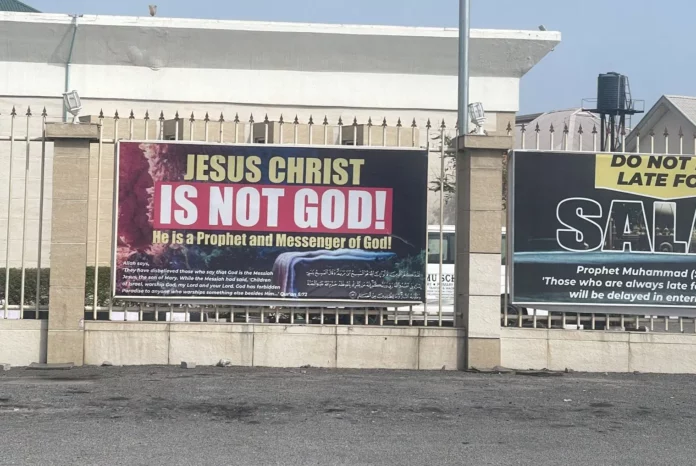A controversial banner displayed at the entrance of Lekki Central Mosque in Lagos State has ignited a firestorm of reactions across social media.
The banner, which went viral on Wednesday, carried the bold inscription: “Jesus Christ is not God. He is a Prophet and Messenger of God!”
This statement has stirred heated debates, with many Nigerians criticizing it as offensive and capable of inciting religious conflict.
Social media platforms were flooded with responses, with some users expressing shock and dismay at the message.
One of the most vocal critics was Nigerian actress Wumi Tuase, who shared her thoughts on X (formerly Twitter).
“I don’t like to get into religious conversations,” she tweeted, “but I found it very weird that Lekki Central Mosque has this in front of their gate.”
For Tuase and others, the banner seemed unnecessary and disrespectful, especially in a religiously diverse country like Nigeria.
Another user, @shinoremy, echoed this sentiment, stating: “The issue with the banner isn’t whether it is true or not. However, it is aimed at countering a religious doctrine, and coming from a religion like Islam, it could possibly incite religious conflicts. We need to do better as a people and just respect ourselves.”
Others questioned the mosque’s motive for displaying such a banner.
“My question is… What’s the reason behind them mounting the banner with such a write-up? What’s their reason for putting that banner?” asked @Mrmara0110.
Some users went further, suggesting that the message was provocative and could deepen divisions between Christians and Muslims in Nigeria.
Critics argue that while everyone is entitled to their beliefs, displaying such a statement in a public space is unnecessary and inflammatory.
However, not everyone viewed the banner as offensive.
A section of social media users defended the inscription, saying it reflected Islamic teachings and similar views have been expressed by Christian leaders.
One user, @Dannymasterp, supported the message, tweeting: “Jesus is not God. Of course, the evidence is very clear. It’s just that the church specializes in celebrating his personality more than his teachings. They call him God because he does miracles without knowing that was a way of making people believe he was sent by God.”
Another user, @GuyMr0, added: “That’s the hard truth. Jesus Christ is not God. He’s a Messenger of God. If Jesus Christ is God, then who was God before Jesus Christ was born?”
Some commenters argued that the banner was an attempt to educate people about Islamic beliefs, even if it might seem controversial.
“So what’s bad about that?” wrote @Haceboiy. “Is Jesus God? No. The mosque was very right to remind the novice who know not about the scriptures but follow pastors’ teachings and church doctrines to realize their senses.”
For others, the debate wasn’t about theology but about respect and coexistence.
Many pointed out that Nigeria’s history of religious violence makes such statements risky, even if they are rooted in individual beliefs.
While it is not uncommon for mosques and churches to promote their doctrines, critics say publicizing statements that challenge the core beliefs of another religion crosses a line.
Religious tolerance remains a delicate issue in Nigeria, a country with nearly equal populations of Christians and Muslims.
Incidents like this often raise fears of escalating tensions in a society that has experienced religious crises in the past.
A few users, however, called for calm and urged Nigerians not to let the banner spark unnecessary division.
“It’s not worth the outrage,” one commenter wrote. “We all know what we believe. Let’s not allow such things to disturb our peace.”
Despite the mixed reactions, the Lekki Central Mosque has yet to issue an official statement addressing the uproar.
The banner, now a symbol of both theological debate and public controversy, continues to generate discussions about the boundaries of religious expression in Nigeria.
Whether this incident will escalate further or fade from public attention remains uncertain.
For many, it serves as a reminder of the importance of mutual respect in a diverse and pluralistic society.

